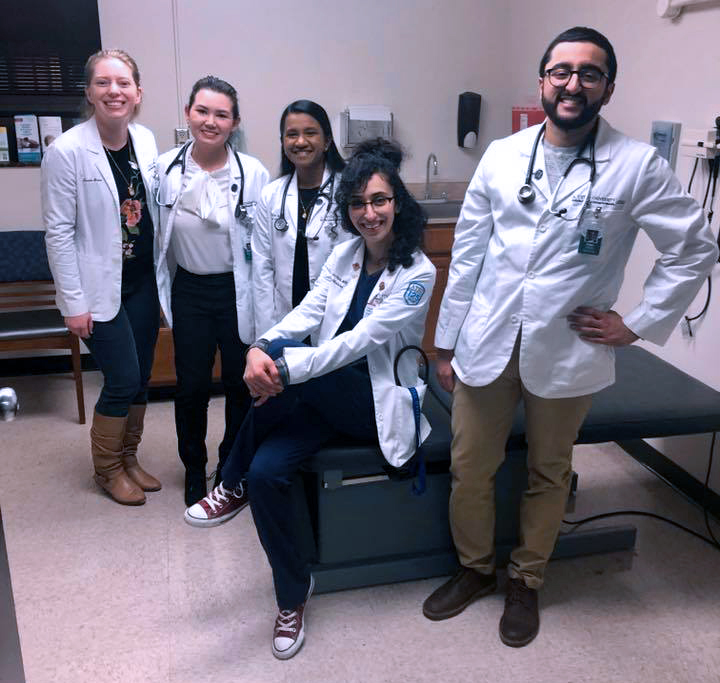ATSU students reach out to uninsured through Still Caring Health Connection
Posted: February 21, 2020
It was their first health screening of the academic year, and students and fellows of Still Caring Health Connection were a bit overwhelmed. They’d taken themselves, their examination tables, and supplies to an Amish community barn, and were greeted by more than 60 people seeking healthcare services.
Christine Harb, a medical education fellow at A.T. Still University of Health Sciences’ Kirksville College of Osteopathic Medicine (ATSU-KCOM) and Still Caring president, remembers a student doctor walking up with tears in her eyes.
One might have expected tears from stress or exhaustion, but they weren’t.
These were tears of appreciation.
“Tonight reminded me why I wanted to be a doctor in the first place,” the student told Harb.
During their first two years, ATSU-KCOM and ATSU-Missouri School of Dentistry & Oral Health students spend a lot of time in classes, lectures, and labs. They study and they’re tested, and then they study some more.
It’s critically important, though students are anxious to begin helping people. That’s where Still Caring Health Connection, in affiliation with Volunteers in Medicine, enters.
“Medicine is a very humanitarian discipline,” Harb said. “This reminds us about why we’re in medical school in the first place.”
Still Caring Health Connection has held four screenings during this academic year, providing healthcare services to uninsured individuals. Those services include taking medical histories and performing physical examinations, diabetes and cholesterol panel screenings, osteopathic manipulative medicine treatments, wellness plans, oral health education and disease prevention screenings, patient education, and more.

Screenings are student-led and provider-supervised, with physicians and dentists volunteering their time to participate.
“It’s a learning experience for us, but a patient’s healthcare is not going to be a learning experience,” said Erica Renfrew, OMS I and Still Caring member. “We have people that are going to make sure we’re doing the right thing.”
Renfrew is originally from Houston and volunteered in a free clinic in Galveston, Texas, as a pre-med student. When she came to Kirksville, Missouri, and found Still Caring, she was quick to get involved.
She hopes to increase event frequency, providing a steady presence for the uninsured. And while the screenings don’t include surgeries or advanced procedures, Renfrew said students can identify concerns and refer patients to local providers.
“We’re reaching out to people who have more progressed things because they haven’t seen a medical professional,” Renfrew said.
ATSU-KCOM Dean Margaret Wilson, DO, ’82, said Still Caring Health Connection gives the University a face in the community, showing ATSU is engaged and giving back. It also provides an outlet for highly driven students and fellows.
“Students really want to do something,” Dr. Wilson said. “We’ve very lucky here, and kudos to admissions, that we get students who want to give back to the community. They really want to do something positive, altruistic.
“I think it’s really good for them to learn how to educate patients, how to talk to patients about things like smoking cessation and diet. That’s hard, but it’s a big part of our job as physicians.”
Harb shared that sentiment.
“Still Caring is important because it teaches students how to talk to patients and it teaches them about the system,” Harb said. “People are products of their environment, which is one of the tenets of the DO philosophy. We’re not just our disease. We need to find health and work for health.
“It gives us an opportunity to practice our clinical skills and educate people. The word ‘doctor’ in Latin means teacher, after all. It’s literally our job to teach. Hopefully, with some education we can help them manage their health or maintain their current health.”
Still Caring Health Connection was initially funded by a grant. Now, annual dues from student members provide money for supplies and equipment. The more than 100 club members aren’t just volunteering time, but investing their money to make Still Caring work.
“This is an opportunity for us to do what we came here to do and to show Kirksville that we care,” Harb said. “This is teaching students about rural medicine. I think rural America has been abandoned in so many ways. It is not just our responsibility, it is our obligation to do more. If we can do more as students, we will.”